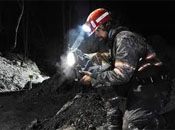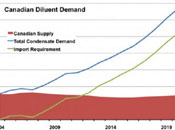"We want to make a strong case for regional collaboration as opposed to countries competing to build smaller projects on their own," said Sumayya Athmani, head of the National Oil Corporation of Kenya (NOCK).
Significant gas reserves have been found in Mozambique and Tanzania, where LNG facilities are now been planned, while drilling will kick off in Ethiopia later this year, and the Somalia's Puntland region is also showing positive signs.
Kenya's first oil discovery has seen a surge of interest in new oil exploration licenses, and is a welcome boost for the country, which spent $4.1 billion on oil imports in 2011.
But the lack of established infrastructure to move the resources to global markets will require huge sums to build modern oil and gas facilities on a continent that lags behind with regard to energy.
Accompanying the sustained growth in the region's upstream industry is strong growth in associated midstream and downstream infrastructure, including export terminals, storage capacity and most critically, pipelines and refineries.
New pipeline capacity will be necessary, particularly where new production is landlocked, such as is the case in Sudan and Uganda.
But pipelines and refineries are expensive, long-term, large-scale investments and it makes little sense to build a refinery in each country, Athmani said.
With adequate infrastructure, even as little as 50 million barrels would be adequate for discoveries in the region to be commercially viable, she said. Without a pipeline, a minimum of 300 million barrels would be required.
NOCK is moving ahead with plans to develop a strategic national petroleum reserve that will hold about 1 billion liters -- equivalent to 90 days consumption, she said.
It is also planning to expand the Mombasa refinery which is designed to improve the refining margin, utilize existing facilities and improve the quality of refined oil products.
In March, Kenyan president Mwai Kibaki officially launched the LAPSSET (Lamu Port--South Sudan--Ethiopia Transport Corridor) project, a massive infrastructure project expected to cost $20 billion.
The project includes an oil refinery, pipelines from South Sudan, transportation hubs for rail, road and air, and a mega-port for oil tankers.
The project has been promoted by the Kenyan government as a way of bolstering energy cooperation between east African states.
But Athmani cautioned that circumstances in the region have changed since the project was first mooted, and new opportunities such as potential pipeline linkages to discoveries in other parts of the region must be studied.
Uganda wants to build a 150,000 b/d refinery initially for domestic consumption and then for regional export in Hoima, about 220 km west of its capital Kampala.
But oil operators question the commercial viability of such a large refinery at a cost of $2.5 billion.
Elly Karuhanga, chair of Uganda's Chamber of Mines and Petroleum, said building a refinery in Uganda would avoid the significant and growing incidences of oil theft and pipeline sabotage in the region.
A 2,000 km pipeline allowing South Sudan to export its oil via the Kenyan port of Lamu, freeing the landlocked country from dependence on a route through Sudan, will begin in next year.
Kenya has said the pipeline could also transport crude from the Turkana region where Tullow Oil found oil deposits in March should they be prove to be commercially viable.
Discussion of how the oil exploration and extraction will proceed and the all-in cost of bringing the oil to market as well as the quality of the types of crude that will need to be exported or refined needs to start now, delegates heard.
The key challenge for the region is to expand its "thinking beyond our territorial boundaries," said Athmani.
Jacinta Moran
Platts























































